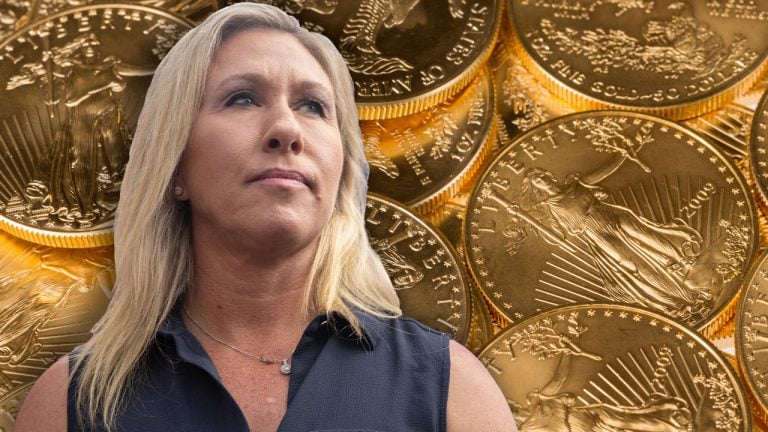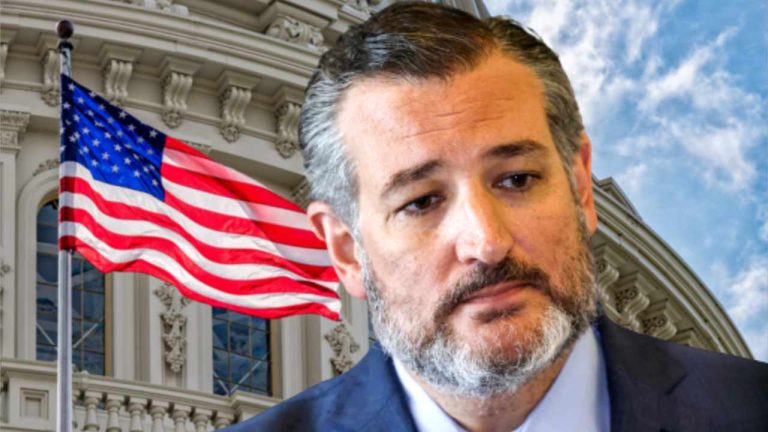
Texas senator Ted Cruz says the amount of capital fleeing US banks is particularly concerning and could signal pain for everyday Americans. Cruz says capital is leaving the smaller financial institutions in favor of the larger banks, creating a consolidation of wealth within the most dominant enterprises. In an interview with Bloomberg, Cruz says Silicon […]
The post Massive Capital Flight From US Banks Is ‘Extremely Concerning’, Hurts Main Street: Senator Ted Cruz appeared first on The Daily Hodl.

The bills state that the trustee must hold a sufficient amount of gold in reserve for all units of digital currency that have been issued and are still in circulation.
Two Texas lawmakers have introduced identical bills for creating a state-based digital currency backed by gold, a move that comes despite objections from several United States lawmakers against introducing a central bank digital currency (CBDC).
Senator Bryan Hughes introduced Senate Bill 2334 on March 10, with Representative Mark Dorazio introducing House Bill 4903 on the same day, stating that a fractional equivalent amount of physical gold would back the proposed digital currency.
“Each unit of the digital currency issued represents a particular fraction of a troy ounce of gold held in trust,” the bills stated.

The bill explains that once a person purchases a certain amount of digital currency, the comptroller would use that money received to buy an equivalent amount of gold.
The purchaser would then receive digital currency equal to the amount of gold that the comptroller purchases with the money received from the purchaser.
The value of a unit of digital currency must be equal to the value of the appropriate fraction of a troy ounce of gold at the time of the transaction.
Related: CBDCs will lead to absolute government control
“The trustee shall maintain enough gold to provide for the redemption in gold of all units of the digital currency that have been issued and are not yet redeemed for money or gold,” the bill stated.
It was added that a fee might be established “at any rate necessary” to cover the costs of administering this chapter.
Although neither of the bills has been passed or presented for a vote, both state that this act will take “effect September 1, 2023.”
Several United States lawmakers have recently argued against the U.S. introducing a CBDC.
Florida Governor Ron DeSantis stated in a March 20 press conference that CBDCs would grant “more power” to the government, adding that it provides the government “with a direct view of all consumer activities.”
Meanwhile, on March 21, Republican Senator Ted Cruz introduced a bill to block the Fed from launching a “direct-to-consumer” CBDC, stating that it’s “more important than ever” to ensure U.S. policy on digital currencies protects “financial privacy, maintains the dollar’s dominance and cultivates innovation.”
Magazine: US enforcement agencies are turning up the heat on crypto-related crime
 Two Republican lawmakers from Texas, senator Bryan Hughes and representative Mark Dorazio, have introduced legislation to create a gold-backed digital currency that could be enacted by the state legislature. The policymakers believe that this currency could greatly benefit the Lone Star State and, as an alternative digital currency, it could provide Texas residents with the […]
Two Republican lawmakers from Texas, senator Bryan Hughes and representative Mark Dorazio, have introduced legislation to create a gold-backed digital currency that could be enacted by the state legislature. The policymakers believe that this currency could greatly benefit the Lone Star State and, as an alternative digital currency, it could provide Texas residents with the […] On Wednesday, Marjorie Taylor Greene (MTG), a Republican member of the U.S. House of Representatives, shared an article about the Federal Reserve’s Fednow project and criticized the central bank’s digital currency efforts. The representative from Georgia insisted that the U.S. should return to the “gold standard” and said she’s taking a “hard pass” on digital […]
On Wednesday, Marjorie Taylor Greene (MTG), a Republican member of the U.S. House of Representatives, shared an article about the Federal Reserve’s Fednow project and criticized the central bank’s digital currency efforts. The representative from Georgia insisted that the U.S. should return to the “gold standard” and said she’s taking a “hard pass” on digital […]
Two lawmakers in one week weighed in against the possibility of a United States central bank digital currency.
Two lawmakers in one week weighed in against the possibility of a United States central bank digital currency (CBDC). Florida Governor Ron DeSantis — expected by many to throw his hat into the ring for the 2024 U.S. presidential race — has called for a ban on a digital dollar in the state. DeSantis spoke out against the Federal Reserve issuing and controlling a CBDC, claiming the initiative would grant “more power” to the government.
Texas Senator Ted Cruz went even further, introducing a bill to block the Fed from launching a “direct-to-consumer” central bank digital currency. Cruz stated it’s “more important than ever” to ensure U.S. policy on digital currencies protects “financial privacy, maintains the dollar’s dominance and cultivates innovation.” The anti-CBDC bill is a second attempt by Senators Cruz, Braun and Grassley, who introduced a similar bill on March 30, 2022, to prohibit the Fed from issuing a CBDC directly to individuals.
Representative Tom Emmer introduced another anti-CBDC bill in February. The bill could prohibit the Fed from issuing a digital dollar directly to anyone, bar the central bank from implementing monetary policy based on a CBDC, and require transparency for projects related to a digital dollar. It’s also presented as an apparent effort to protect Americans’ right to financial privacy.
The next G7 meeting in May might bring a push from seven of the world’s advanced economies for stricter regulations on cryptocurrencies globally. Together, leaders from Japan, the United States, the United Kingdom, Canada, France, Germany and the European Union will outline a cooperative strategy to increase crypto transparency and enhance consumer protections, as well as address potential risks to the global financial system, officials told journalists.
Recommendations on the regulation, supervision and oversight of global stablecoins, crypto assets activities and markets are scheduled to be delivered by July and September 2023. It is unclear, however, what the overall tone of the recommendations will be.
The U.S. Internal Revenue Service (IRS) said it plans to release guidance on having nonfungible tokens (NFTs) treated as collectibles under the U.S. tax code. According to the government body, collectibles under U.S. tax law “do not have as advantageous capital-gains tax treatment as other capital assets,” seemingly referring to how crypto assets are currently taxed in the country. Under the U.S. tax code, selling collectibles such as coins or artwork is subject to a maximum capital gains tax rate of 28%. The proposed IRS guidance could apply the same standard to an NFT certifying ownership of a coin, piece of art or similar collectible.
Cody Harris, a member of the Texas House of Representatives, has introduced a resolution to have the legislature say the “Bitcoin economy is welcome” in the state. Harris encourages Texas lawmakers to “express support for protecting individuals who code or develop on the Bitcoin network,” as well as miners and Bitcoiners operating in the Lone Star State. House Concurrent Resolution 89, if adopted, would largely not apply to Texas’ laws and regulations but instead express a certain sentiment among lawmakers.

Texas Senator Ted Cruz is proposing legislation to prevent the Federal Reserve from creating a central bank digital currency (CBDC). CBDCs are the digital form of a country’s fiat money and unlike cryptocurrencies like Bitcoin (BTC), these assets are issued and backed by the government. Cruz argues that the creation of the CBDC will centralize […]
The post Texas Senator Ted Cruz Launches New Bill To Block US Government From Creating CBDC appeared first on The Daily Hodl.
 U.S. Senator Ted Cruz has introduced “legislation to prohibit the Federal Reserve from developing a direct-to-consumer” central bank digital currency (CBDC). The lawmaker warned that it “could be used as a financial surveillance tool by the federal government.” Another senator stressed: “The American people ought to be able to spend their money how they choose […]
U.S. Senator Ted Cruz has introduced “legislation to prohibit the Federal Reserve from developing a direct-to-consumer” central bank digital currency (CBDC). The lawmaker warned that it “could be used as a financial surveillance tool by the federal government.” Another senator stressed: “The American people ought to be able to spend their money how they choose […]
Ted Cruz said it is “more important than ever” to ensure the financial privacy of American citizens is preserved.
Republican Senator Ted Cruz has introduced a bill to block the United States Federal Reserve from launching a “direct-to-consumer” central bank digital currency (CBDC).
In a March 21 statement, Cruz said he introduced the bill to prevent the Fed from developing a retail CBDC “which could be used as a financial surveillance tool by the federal government.”
Cruz stated it’s “more important than ever” to ensure U.S. policy on digital currencies protects “financial privacy, maintain’s the dollar’s dominance and cultivates innovation,” and added:
“CBDCs that fail to adhere to these three basic principles could enable an entity like the Federal Reserve to mobilize itself into a retail bank, collect personally identifiable information on users, and track their transactions indefinitely.”
Cruz claimed the federal government has “no authority to unilaterally establish” a CBDC.
“We should be empowering entrepreneurs, enabling innovation, and increasing individual freedom — not stifling it,” he stressed.
The federal government has no authority to unilaterally establish a central bank currency.
— Senator Ted Cruz (@SenTedCruz) March 21, 2023
Read about my new bill in @FoxBusiness: Ted Cruz introduces bill blocking Fed from adopting central bank digital currencyhttps://t.co/LoX3u41nA4
Cruz’s anti-CBDC bill has the backing of Republican Senators Mike Braun of Indiana and Chuck Grassley of Iowa.
In statements, both expressed the belief that a CBDC would be used as a surveillance tool.
If the bill is passed into law, it would ensure that the state isn’t “snooping” on the finances of hardworking Americans, Grassley stated:
"The American people ought to be able to spend their money how they choose without the possibility that every transaction could be tracked by the government."
The anti-CBDC bill is a second attempt by Cruz, Braun and Grassley, who introduced a similar bill on March 30, 2022 to prohibit the Fed from issuing a CBDC directly to individuals.
However, nearly 12 months later, the bill still hasn’t moved past the introduction phase.
Meanwhile, considerable progress is being made on a U.S. dollar CBDC since President Joe Biden signed an executive order to “Ensuring Responsible Development of Digital Assets” in March, 2022.
In November, the Federal Reserve Bank of New York and several large financial firms including BNY Mellon, Citi, HSBC, and Wells Fargo participated in a 12-week digital dollar pilot program with MasterCard and SWIFT.
Related: ‘Programmable money should terrify you’ — Layah Heilpern
Cruz, Braun and Grassley aren’t the only U.S. politicians fighting to stamp out CBDCs.
On March 20, Florida’s Governor Ron DeSantis called on state lawmakers to introduce legislation banning the digital dollar in Florida.
DeSantis compared the digital dollar to China’s digital yuan and claimed the e-CNY has been used to extensively “monitor citizen behavior,” saying:
“Any way they can get into society to exercise their agenda, they will do it. So, what the central bank digital currency is all about is surveilling Americans and controlling behavior of Americans.”
No CBDC in Florida https://t.co/p9pwSTmrlN
— Ron DeSantis (@GovRonDeSantis) March 20, 2023
U.S. Congressman Tom Emmer recently introduced an anti-CBDC bill of his own on Feb 22.
Emmer also spoke of the privacy concerns surrounding CBDCs saying a programmable dollar could be “easily weaponized” as a spying tool to “choke out politically unpopular activity.”
Magazine: Are CBDCs kryptonite for crypto?

US Senator Ted Cruz wants lawmakers in Washington D.C. to be able to purchase their vending-machine snacks using crypto assets. Cruz submitted a resolution earlier this week that would require the Senate and the House of Representatives to only work with food service and vending machine contractors that accept cryptocurrencies. The resolution would apply to […]
The post Got Bitcoin? US Senator Ted Cruz Introduces Bill To Enable Crypto Payments on Capitol Hill appeared first on The Daily Hodl.

A newly introduced resolution could potentially see lawmakers buying sodas and chips using crypto-supporting vending machines.
Texas Republican Senator Ted Cruz is pushing the United States Congress to adopt cryptocurrency within its halls using an incentive both sides might agree on — food.
Cruz introduced a concurrent resolution dated Jan. 25 that would only allow vending machine and food service contractors that accept crypto as a payment option within the U.S. Capitol.
If adopted, the Architect of the Capitol, the Secretary of the Senate and the Chief Administrative Officer of the House of Representatives would be required to find the crypto-accepting food and vending firms.
At the time of writing, the text of the resolution was not publicly available on the Congress website. It’s unknown the potential cost of implementing the measure, or if the resolution would require contractors to take payment in certain cryptocurrencies.

Cointelegraph contacted Cruz’s office for comment but did not immediately receive a response.
Cruz has long been a vocal advocate for cryptocurrencies, especially lauding Bitcoin (BTC) for its decentralization. At roughly this time last year, the senator bought between $15,000 and $50,000 worth of BTC, according to a financial disclosure.
Related: Crypto industry leaders ‘scared of a strong SEC’ — Senator Warren
He is one of only eight known crypto investors in Congress, according to the “Bitcoin Politicians” crowdsourced data project.
The list also includes Cynthia Lummis, the Wyoming senator behind a pro-crypto piece of legislation and Pat Toomey, a Pennsylvanian senator who recently introduced a stablecoin bill aiming to create a regulatory framework for payments.
Senator Cruz also has signaled his interest to make his home state of Texas an oasis for Bitcoin and other cryptocurrencies, saying crypto mining could be used to monetize the energy from oil and gas extraction and the activity may be used as an alternate way of storing energy.
The resolution put forward by Cruz will need to be agreed to in both the Senate and the House before it can be adopted.